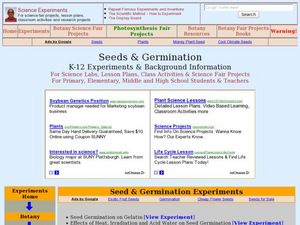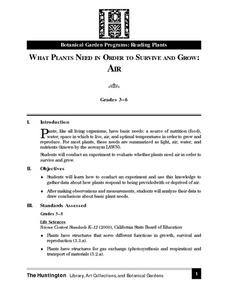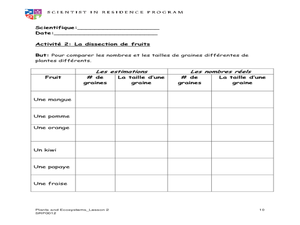Curated OER
George Washington Carver
Learners write three contributions made to society by George Washington Carver. They complete a handout listing the four things plants need to grow.
Curated OER
Vermicomposting
Fourth graders explore insect life by viewing a soil presentation in class. In this composting lesson, 4th graders read assigned text about the process of composting soil and the necessity of soil in plant life. Students view video clips...
Curated OER
Chapter 16, Food Biotechnology
Although the points given on these slides are valid, the visual accessibility is poor. Consequently, many viewers would be distracted or entirely unable to view the presentation. The content is a review of microorganisms and their...
Curated OER
Root Caps and the Effect on Gravity Sensing
Students conduct an experiment to determine how the absence of a root cap affects a plant's ability to sense gravity. They make comparisons between capped and decapped roots.
Curated OER
Profit From Pumpkins
Third graders cut open a pumpkin. In this math lesson, 3rd graders complete the worksheet "From Seed to Pumpkin" and then clean out their pumpkins to see how many seeds are in it.
Curated OER
It's All About the Roots
Learners investigate the process of hydroponic agriculture. They grow beans in different hydroponic solutions, compare results and graph their observations.
Curated OER
PICTURE PERFECT PYRAMID
Students create a model of the USDA's Food Pyramid Guide, using shoe boxes. They bring an assortment of shoe boxes from home. Students are given a copy of the "Food Guide Pyramid." They wrap boxes for the bread group in white, the...
Curated OER
A Hidden Beauty
Expose the beautiful mystery of bulbs as young botanists learn all about these fascinating plants. They glean information from a short text before observing actual bulbs (consider an onion), and comparing their findings with predictions....
Curated OER
Allelopathy Experiments
Students explore how allelopathy works in plants. In this botany lesson, students explain how this phenomenon affect other organisms. They read and analyze an article about allelopathy and discuss its flaws.
Curated OER
Seeds & Germination
Students study the types and parts of seeds and how they have evolved. In this germination lesson students complete experiments that show the effects of variables role in seed germination.
Curated OER
What Plants Need in Order to Survive and Grow: Air
Young scholars conduct an experiment to determine whether plants need air in order to survive and grow. They discuss natural resources, analyze slides, and observe and record data from the experiment.
Curated OER
Monarch Migration
Third graders investigate the life cycle of the Monarch butterfly. They experiment with various tools to simulate the mouth parts of insects, conduct research, record their observations of butterflies hatching, write a play, complete...
Curated OER
Guetemala's Changing Forest
Eighth graders compare their local ecological zone to the tropical rainforest. In this natural ecology lesson plan, 8th graders complete an activity about the differences in ecological zones. They compare their biome to the Guatemalan...
Curated OER
RIDE THE WILD LEAF
Students identify and interpret that leaves provide food for new trees and plants. Students cut out leaves and glue them on the appropriate
number on included worksheet. Students collect different types of leaves and make leaf rubbings....
Curated OER
Water Quality and Nitrates & Phosphates
Students examine the effects of nitrates and phosphates on the dissolved oxygen levels in different water sources. In this series of 3 lessons, they consider the reasons for nitrate and phosphate level increases and their effects on...
Curated OER
Soil Research
Third graders work together in groups to discover the importance of soils. Using a worksheet, they answer questions as they surf the internet. They observe three different types of soils and record their observations and use the internet...
Curated OER
Circles in the Landscape: Irrigating Oklahoma Crops
How do you grow crops in a area with insufficient rainfall? Why you irrigate, of course. Class members investigate irrigation systems by designing a system of their own. After examining irrigation related concepts, vocabulary terms, and...
Curated OER
Sun Seeking Plants
Young scholars investigate the story "The Tiny Seed" by Eric Carle. This story is used to introduce the children to the concept that seeds change and grow into plants when conditions in the environment including temperature, light, water...
Curated OER
Photosynthesis: Intake of Carbon Dioxide - Production of Oxygen
High schoolers, after a long-term observation of photosynthesis with aquatic plants, assess the benefits of photosynthesis towards all living organisms. They explain in their own words the two cycles within photosynthesis. Guided...
Curated OER
Super Seeds Super Grains
Students explore the life cycle of plants. In this agricultural instructional activity, students discover the two ways that seeds germinate. Students dissect seeds and record data. Resources are provided in French and English.
Curated OER
Algae Experiments
Students describe the characteristics of algae. In this biology lesson, students perform a series of experiment to explore algae. They investigate the basic things algae need to survive.
Curated OER
Learning From Leaves: From Observation to Inference
Students examine the adaptation of plants to their environments. They analyze and observe the structure, shape, and internal structure of various leaves, and make inferences about the structures.
Curated OER
Composting
Students discover the concept of decomposition. They examine how it makes the soil more fertile and how it helps plants. They put a compost bin in their backyard and record their observations.
Curated OER
Using the Prefixes 're' and 'non-'
In this prefixes worksheet, students complete 4 sentences using the 're' or 'non-' words in the word bank. Students make up 2 clue sentences with a prefix 're' or 'non'. Then students give a definition for 4 prefix words.

























